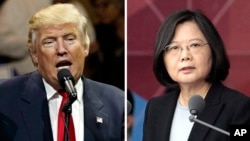Donald Trump’s team downplayed the significance of the president-elect’s telephone conversation with President Tsai Ing-wen of Taiwan, with which the United States has had no formal diplomatic ties since 1979.
“This was a courtesy call,” said Vice President-elect Mike Pence Sunday on ABC’s This Week program. “It’s a little mystifying to me that President Obama can reach out to a murdering dictator in Cuba in the last year and be hailed as a hero for doing it, and President-elect Donald Trump takes a courtesy call from the democratically-elected leader in Taiwan and it’s become something of a controversy."
Trump’s tweet on Friday announcing a telephone conversation with President Tsai stoked questions as to whether he intends to alter America’s longstanding acknowledgement of Beijing’s “One China” policy that precludes any official recognition of Taiwan.
But, while saying the controversy is overblown, Pence did not dispute that Trump intends a more assertive U.S. posture towards China on trade and other matters.
“He’s going to fight for American jobs, and we’re going to stop losing to China and other countries,” the vice president-elect said.
Trump was blunt about China during the campaign.
“We have a $500 billion trade deficit with China,” Trump said in May while seeking the Republican presidential nomination. “We can’t continue to allow China to rape our country, and that’s what they are doing. It’s the greatest theft in the history of the world.”
So far, China is conveying a restrained response to the Trump-Tsai phone call.
“It was just a stunt by Taiwan,” said Chinese Foreign Affairs Minister Wang Yi. “It will not change the international bedrock of the One China policy. It will not change the One China policy that the United States has adhered to for years.”
Despite no formal ties, the United States and Taiwan have cooperated on military matters for decades. Whether Trump intends to expand the boundaries of that relationship as part of his promise to get tougher with China likely will remain a mystery until he assumes office next month.
No U.S. president or president-elect had such contact with a Taiwanese leader since Washington switched diplomatic recognition from Taipei to Beijing.
In the 1979 U.S.-China Joint Communique, the U.S. recognized Beijing as the sole legal government of China, acknowledging the Chinese position that there is but one China and Taiwan is part of China.
Chinese state media said that Trump's "inexperience" led him to accept the call, but warned that breaching the one-China policy would "destroy" relations between Washington and Beijing.
Trump seemed bemused by the reaction to the call, saying on his Twitter account, "Interesting how the U.S. sells Taiwan billions of dollars of military equipment but I should not accept a congratulatory call."
Over China's objections, U.S. President Barack Obama a year ago authorized a $1.83 billion sale of defensive weapons to Taiwan, including two frigates, amphibious assault vehicles, and anti-aircraft and anti-ship systems.
Ken Bredemeier contributed to this report.

